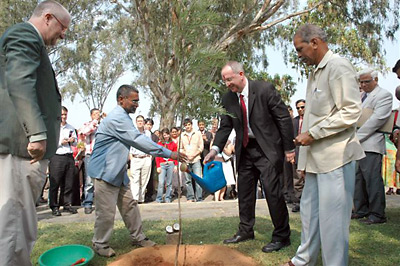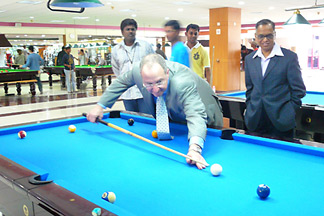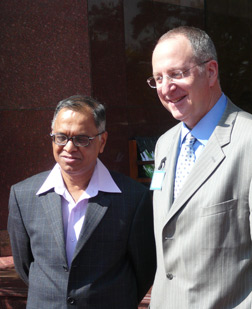Back from India, Skorton says meetings with leaders left him impressed and optimistic
By Krishna Ramanujan


Cornell President David Skorton recently returned from a 10-day, four-city tour of India, seeking to extend Cornell's mission as the world's land-grant university by building stronger bridges between Cornell and India, and to reinvigorate ties with the alumni in the world's largest democracy.
Skorton was, he said, both impressed and optimistic after a wide range of meetings. And he was particularly struck by the warmth of his meetings with Cornell alumni in India.
During the Dec. 29-Jan. 8 visit, he met and consulted with the country's prime minister, Manmohan Singh, and president, A.P.J. Abdul Kalam, as well as with influential leaders in government, industry and education in New Delhi, Mumbai, Bangalore and Hyderabad.
Skorton and the delegation (Vice Provost David Wippman, Vice Presidents Charles Phelgar and Tommy Bruce, CALS Professor Ronnie Coffman, and Banoo Parpia, director of international affairs) also met with many of Cornell's 500 to 600 alumni in India at events in New Delhi and Mumbai, while kicking off a new alumni association in Bangalore. Skorton also met with business leaders Ratan Tata, B.Arch '62, chairman of Tata Sons Ltd., and N.R. Narayana Murthy, chairman and chief mentor of Infosys Technologies Ltd. Both men are Cornell trustees.
Speaking about the exploratory nature of the trip in an interview in his campus office on Monday, Skorton said, "Because I feel strongly that direct dialogues between academic leaders and faculty on our campus and their counterparts on Indian campuses and organizations are the way to arrive at decisions about what to do, what to stop doing and what to do more of, I went in specifically with the idea that I would try not to seal any agreements."
Cornell currently has nine memorandums of understanding with Indian institutions and is looking for ways to increase its presence in the country. A follow-up trip by Cornell Provost Biddy Martin and some of the academic deans and faculty will be a key to building on the gains made during this trip, he said.
"One of the things that we heard multiple times on the trip from many different people was how important it is that there be meaningful follow-up from this sort of high-level delegation and how disappointing and frustrating it could be" if such a follow-up did not occur, Skorton said.

During his meeting with Prime Minister Singh, Skorton said he shared some of his observations about India, including the nation's multicultural diversity, the "wide variety of human experience" and the growth and "tremendous optimism and courage" in light of the vast problems and issues the country faces. For example, he said, India has found a way to grow enough food to feed its 1 billion people. He also noted the striking disparities between rich and poor and "how socially and ethnically complex India is and how much in awe I am of how the culture actually works in a multiethnic, multi-religious way," he said.
Skorton also commented to Singh that there were common societal, scientific, medical and agricultural problems that higher education institutions in both countries could more effectively help solve by working together. The two men talked about how to address a major challenge faced by Indian universities in persuading the brightest students not to leave academia for lucrative jobs in private industries.
"Both the president and prime minister were very impressive, straightforward, communicative people who gave their time generously," Skorton said. "I left both those meetings feeling optimistic that we would have support in the form of advice and guidance on how to do the best job we can in partnering with our Indian colleagues," he said.
Skorton noted that many of the alumni he met said Cornell should continue to find ways to keep them informed of what is happening on the Ithaca campus. He added that Indian alumni are hungry to help advise the university on everything from new opportunities to fine-tuning what Cornell is already doing in India. He was "overwhelmed by the warmth and offers of advice," which, he said, he considered invaluable for a president new to Cornell. About 400 students from India currently attend Cornell.
While Indian newspapers suggested the Cornell delegation was in the country to raise money from Indian alumni, Skorton said fund-raising was not a goal of this trip.
Skorton and his delegation also met with government officials in the Departments of Agricultural Research and Education, Biotechnology and Information Technology and with the heads of such Indian educational and medical institutions as Delhi University, the International Crops Research Institute for the Semi-Arid Tropics in Hyderabad, the Asian Heart Institute in Mumbai, the Indian Institute of Science in Bangalore (which has about a dozen Cornell alumni on the faculty) and the Tata Institute for Fundamental Research.
Skorton said the last two institutions and Delhi University were particularly impressive, with "superb faculty, great instruction and cutting-edge research going on."
Media Contact
Get Cornell news delivered right to your inbox.
Subscribe